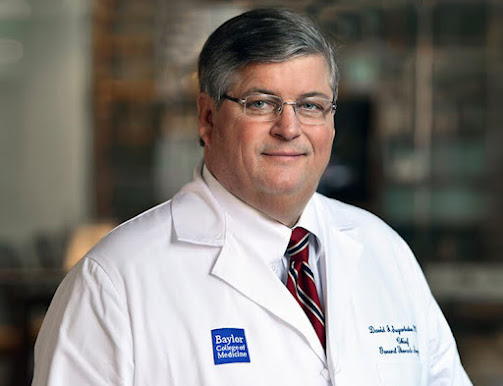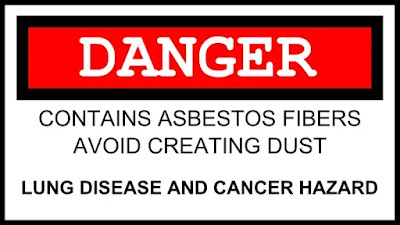Dr. David Sugarbaker, Baylor College of Medicine, His Role towards Treating Mesothelioma
When you talk about mesothelioma and its treatment, you can't leave the name of Dr. David Sugarbaker. To be precise, Dr. David Sugarbaker was a renowned expert ever existed for treating severe conditions like mesothelioma.
Those who have to face the condition in anyway might have known his name. It's because Dr. David Sugarbaker was also known from his peers as "Mr. Mesothelioma" mainly because of his huge knowledge and hundreds of achievements he has done in treating such conditions.
He is also known for designing some
of his own ways of treating mesothelioma using his innovative treatment style
like multimodal therapy. After giving his precious services to the nation, he
died on Aug. 29, 2018.
Who's Dr. David Sugarbaker?
Dr. David Sugarbaker is a name
registered in the history of doctors who have treated severe conditions like
mesothelioma.
He was a specialized thoracic surgeon
who was known in a plethora of mesothelioma community proudly as “Mr.
Mesothelioma,”
Without any doubt, he has left behind
his supreme legacy towards monitoring a large number of mesothelioma doctors
across the entire nation.
He came forward to help upcoming
research scholars and doctors to equip themselves with all the latest research
programs that are needed for a cure to cancerous mesothelioma.
It also helped to improve existing
treatment options that are already there to help patient live longer life span.
Dr. David Sugarbakeris was always
commitment towards patients and also fighting various cancerous ailments in a
better way.
Sugarbaker was also the former director of Lung
Institute at the Baylor College of Medicine in Houston.
With his specialization in his field
and dedication towards his work, he later built his own multidisciplinary
program that actually combined a mesothelioma research institute along with an
unmatched clinical practice.
Sugarbacker achieved hundreds of
milestones in his long career. For example, he was also a commendable chief of
general thoracic surgery at Baylor, developed his reputation through the
previous 25 years he had spent at Brigham and Women’s.
While Sugarbacker worked there in the
hospital, he soon designed a kind of aggressive surgery called extrapleural pneumonectomy. It
basically helps removing a cancerous lung, the lining around the lung and
heart, along with nearby lymph nodes and a portion of the diaphragm.
He not only lived a life of a doctor
but also worked as a surgical innovator that7 helped lower down operative
mortality rate.
His worked also helped extending the
lives of a number of patients and directed the entire mesothelioma community
towards finding a cure of this disease.
During his dedicated years, Sugarbacker
managed to earn all the respect of his patients and peers where a number of
them travel around the world for different works.
Dr. David Sugarbaker's Message
Dr. David Sugarbaker gave a message
to all those linked with the treatment of mesothelioma.
He said, “It’s an opportunity to take
all that I’ve learned [in Boston] and do it on a bigger scale now,” Sugarbaker
told Asbestos.com. “This is a chance to do something that could really benefit
the entire mesothelioma community in a major way.” he said.
As per asbestos.com, Sugarbacker
called “Mr. Mesothelioma,” by those who worked at the Brigham and Women’s
Hospital in Boston.
While working in Boston, he founded
his own International Mesothelioma Program which was one of a kind. To be
precise, it was the largest institute primarily meant for the treatment and
research of such ailments.
The institute lines up several
medical staff and divisions to Boston from around the world.
He's also known to have expected his
efforts in Texas for making right efforts opening the door for new research
efforts for anyone to help them get the best treatment available.
How Dr. David Sugarbaker Succeeded As Research Scholar
Without any doubt, Dr. David
Sugarbaker conducted hundreds of researchers in his lifetime.
He was primarily looking for the
precise treatment of conditions like mesothelioma.
For that he designed his own
laboratories that successfully identified particular gene rations in various
tumors caused by this asbestos related condition.
Sugarbacker's efforts also helped him
reap a deeper and vast knowledge about mesothelioma and related medical
conditions.
His approach was simply to move away
from a sort of ineffective approach towards the treatment of this condition.
This is what Sugarbaker said in one
of his speeches, “We are in the midst of a worldwide epidemic of mesothelioma,
both in the United States and in Europe, where the epidemic is not expected to
peak until 2020,” he said.
Sugarbacker worked dedicatedly to
become an expert of the disease. He studied hundreds of frozen mesothelioma
samples that clearly identified a few molecular markers specific to the above
condition.
The findings led by his team that
aided the search for many others who exposed to asbestos. And this became the
only known cause of this serious illness.
During his professional journey,
Sugarbaker chose to attend the Cornell University Medical School. He later
completed his cardiothoracic training at Toronto General Hospital.
Finally, he returned back to Brigham
as a surgeon in the year 1988 which helped start his interest in detecting the
asbestos-related cancer.
Since the above research and
development, a number of medical journals have been published. All the research
was specifically meant on extending the lives of mesothelioma affected patients
and helps them equip with more treatment options.
Please also note that Sugarbaker’s
interest also included studying non-small cell cancer and esophageal cancer,
lung volume reduction surgery, minimally invasive surgery, video-assisted
thoracic surgery, and general thoracic surgery.
Read More- Sarcomatoid Mesothelioma symptoms, Diagnosis and Treatment
Dr. Sugarbaker Interview In 2012 Given to Asbestos.com
From the very beginning, especially
after knowing his dedication towards the subject, Dr. Sugarbaker reaped great
results in the field of thoracic surgery.
And this proves that David Sugarbaker
who was the freshly appointed director of the Lung Institute at Baylor College
of Medicine, became the most desired and respected expert of mesothelioma.
In other words, you can say that he
was born and raised to learning different aspects of this condition.
In his family, Sugarbacker had a huge
family who was one of the 10 children. Out of them 5 became doctors.
Life Lessons Given By the Surgeon
Sugarbaker has done so much towards
the treatment of mesothelioma and other such diseases. For example, he came forward
to acclaim International Mesothelioma Program (IMP) in Boston in the year 2002.
In his early professional life, he
moved his focus towards treating life threatening conditions and from there, he
simply played a major role in working towards their treatment.
He has a number of untold stories
that are worth inspiring for everyone. For example, his desire and approach
towards mesothelioma didn't kick start from the college of his graduation in
1979 (Cornell University Medical College).
It rather started at his home when he
was listening to his father, especially when he was working with his family
members at 16-acre apple orchard in Jefferson City.
At that time, he said there was huge
work required to complete during summer, spring and winter when you have to run
an apple farm. And you have to continue it even when you don't have any sort of
positive reinforcement.
While working for all the year, you
just need to have faith to get a return of your hard work.
And this is what Sugarbacker said
after learning his lessons of life. He said that he learnt a lesson back from
home that without getting anything positive, you have the ability to work for a
long time.
The point here is that you just have
to believe in your abilities. He said it actually played a great role in his
outlook (with mesothelioma).
Although, a lot of research and
development in treating mesothelioma is done, there is still no cure for
mesothelioma.
Also Read: Asbestos: What Is Asbestos & How It Becomes the Cause for Cancer?
Is There Any Room for Hope?
Out of several experiments conducted,
Sugarbacker believed there is a room for the treatment of mesothelioma. This is
why he built a Lung Institute in Texas for the purpose of Mesothelioma
Research. All it was done to find a cure for the same.
At some point of time, he expected it
to bigger and better as compared to IMP as it combines a high class approach in
the treatment of mesothelioma.
In 2014, Sugarbacker left Boston. He
had to leave in the middle of a program that could have continued to thrive
under the new leadership.
This is what he had once said,
"When you have a hope, anything can be possible," he said. He soon
got involved in his fight towards mesothelioma right after he returned from
Brigham and Women’s.
It all happened when he came to know
that some nearby shipyards around Boston had a long time exposure to asbestos.
Due to this, it produced a handful of mesothelioma patients for him to cure.
And this is where he accepted the
challenge. He also said that it was quite difficult to treat it; the only way
was to stick with it. He was drawn to that after he made a number of slides.
How Patients Made to Live Longer Than Before
It was mainly through the success
stories of patients that helped Sugarbacker to get motivated throughout his
career. He never forgot to take pride in every single step towards finding a
proper cure for mesothelioma.
He also believed that the only way to
help ailing people is by giving them quality life extension.
He said there are different types of
people who are diagnosed with mesothelioma. There are some who are diagnosed 10
years back and there are some who are given only a few years of life after the
diagnosis.
Due to all of his achievements,
Sugarbacker's patients and peers call him the leader in his field. He also
featured in a plethora of events and cancer seminars.
He once appeared in one of the
episodes of ABC’s “Boston Med”. The episode had featured the very treatment of
a mesothelioma patient.
Also Read: How to Handle the Growing Danger of Asbestos in Schools?
Dr. Sugarbaker's Publications
Take a look at some of the
publications by Dr. Sugarbaker below:
Sugarbaker, D. J., Mentzer, S. J.,
& Strauss, G. (1992). Extrapleural pneumonectomy in the treatment of
malignant pleural mesothelioma. The Annals of thoracic surgery, 54(5), 941-946.
Retrieved from http://www.annalsthoracicsurgery.org/article/0003-4975(92)90654-M/fulltext
Sugarbaker, D. J., et al. (1993).
Node status has prognostic significance in the multimodality therapy of
diffuse, malignant mesothelioma. Journal of Clinical Oncology, 11(6),
1172-1178. Retrieved from http://ascopubs.org/doi/abs/10.1200/jco.1993.11.6.1172
Sugarbaker, D. J., Jaklitsch, M. T.,
& Liptay, M. J. (1995). Mesothelioma and radical multimodality therapy: who
benefits?. Chest, 107(6), 345S-350S. Retrieved from
http://journal.chestnet.org/article/S0012-3692(15)47946-2/abstract
Sugarbaker, D. J., et al. (1996).
Extrapleural pneumonectomy in the multimodality therapy of malignant pleural
mesothelioma. Results in 120 consecutive patients. Annals of surgery, 224(3),
288. Retrieved from https://www.ncbi.nlm.nih.gov/pmc/articles/PMC1235368/
Sugarbaker, D. J., & Norberto, J.
J. (1998). Multimodality management of malignant pleural mesothelioma. Chest,
113(1), 61S-65S. Retrieved from
http://journal.chestnet.org/article/S0012-3692(15)47596-8/abstract
Sugarbaker, D. J., et al. (1999).
Resection margins, extrapleural nodal status, and cell type determine
postoperative long-term survival in trimodality therapy of malignant pleural
mesothelioma: results in 183 patients. The Journal of thoracic and
cardiovascular surgery, 117(1), 54-65. Retrieved from
http://www.semtcvspeds.com/article/S0022-5223(99)70469-1/fulltext




Comments
Post a Comment